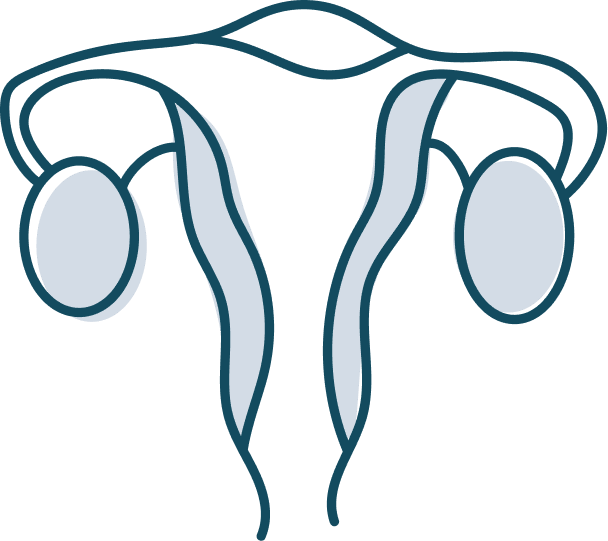How to tell if your irregular period is actually irregular
Words by
Eleni Stefanou
Medically reviewed by
Dr Georgina Leslie, Clinical Lead at Bloomful
Updated on
23 Jan 2023
How do doctors define a regular menstrual cycle?
When we talk about regular periods, we’re actually referring to the length of your full menstrual cycle and how regular it is. Let’s break this down. Your cycle length is the number of days from the first day of your period (day 1) to the day before your next period starts (typically day 28).
Your cycle length may vary from cycle to cycle. For example, it could be 25 days one month and 30 days the next. As long as the difference between cycle lengths is no greater than seven days, then your cycle is considered regular. Anything over seven days is considered irregular.
Can you give an example of an irregular period?
Someone with polycystic ovary syndrome (PCOS) might have a cycle that is 35 days followed by a cycle that is 50 days. In this case, the difference between their cycles is 15 days. Their cycle would therefore be described as irregular.

How can I tell if my period is irregular?
Tracking the length and regularity of your cycle in a diary or app is a great way to keep an eye on your menstrual health. Mark the first day of your period for at least 3 cycles to get a clear picture.
It’s also important to keep a record of other factors that may fluctuate. This can be really helpful when voicing any concerns with your doctor. Keep a note of:
Period length: The number of days you bleed. While the average is five days, it’s quite normal for this number to vary by a few days each cycle.
Period heaviness: Noting how many pads you use a day and how soaked they are is a good way to gauge how heavy your flow is. Often, the first few days of a period are the heaviest and the bleeding tails off towards the end. If you bleed a lot during your period, make sure you read our explainer on heavy periods.
Period pain: Generally speaking, the heavier the period the more pain you may experience. If the pain is putting a strain on your daily activities, you should seek advice.
Intermenstrual bleeding: Bleeding that occurs unexpectedly between periods.
Post-coital bleeding: Bleeding that occurs after sex.
You can also record additional symptoms such as pelvic pain, mood, libido and bowel changes. All of this data can be helpful to have when speaking to a doctor as it gives them a fuller picture of your menstrual health.

Should I be worried?
An irregular period doesn’t necessarily mean something serious is going on. Many conditions can be treated easily or can be explained by short-term changes to your hormones. Having said that, it’s important to rule out more serious conditions that could have a long-term effect on your health or cause complications with fertility and pregnancy.
Irregular periods can indicate a hormonal imbalance such as high insulin or testosterone levels, which can have a knock-on effect on your health and quality of life, so make sure you speak to a medical professional if you feel something is off.

When should I see a doctor?
It’s important to see your GP/gynaecologist if you’re experiencing one or more of the below:
Your cycle is irregular and fluctuates more than 20 days between your longest and shortest cycle
Your period (bleed days) lasts more than 7 days
Your periods come very quickly, more often than every 21 days
Your periods are very infrequent, coming less often than every 35 days
You’re under 45 years old and your periods suddenly become irregular
You have irregular periods and you’re trying to conceive (this is so you can receive early advice and support with any fertility-related issues that may arise. More on this below!)
What causes an irregular period?
Hormones govern your menstrual cycle. It follows that hormonal changes can cause fluctuations in your cycle, including regularity. Hormonal changes are common when we hit puberty, after puberty, and towards the end of our fertile years (the perimenopause). Because of these fluctuations, it’s common for our cycles to become irregular during these stages of life.
Other conditions and events that can disrupt your hormone cycle and consequently lead to irregular periods include:
Polycystic ovary syndrome
Thyroid issues
Significant weight loss
Stress
Exercise training
Pregnancy
Do irregular periods affect fertility?
Not necessarily. In most cases, if you have a period, this means you’ve ovulated, meaning you’ve released an egg that can be fertilised. However, figuring out the best time to conceive can be tricky when your period is irregular.
In a typical 28-day cycle, ovulation should occur around day 14. For the best chance of conception, it is recommended that people have sex every other day between day 10 and 16 of your cycle to make sure you’re in the window of ovulation.
If you have an irregular cycle, this timing will vary, making it difficult to predict the best window to have sex in. In these cases, it can help to watch for ovulation clues such egg white discharge (a fluid that has an egg white tint to it) or you can use ovulation testing sticks.
If you have very infrequent periods (every two months or longer), it can be difficult to know whether you are ovulating or not. In a regular cycle, ovulation causes a shift in your hormones that leads to a period roughly two weeks later. When ovulation doesn’t occur, this hormonal shift doesn’t take place. Instead, your hormone levels slowly decline until the lining of the uterus (the endometrium) isn’t supported and eventually a bleed occurs as a result. Typically, the bleed is longer than a normal period and can also be heavier.
As mentioned above, if you have an irregular cycle and are trying to conceive, speak with your GP or gynaecologist. Conditions such as PCOS can cause irregular cycles and, as a result, can affect fertility.
Remember, ovulation isn’t the only factor affecting fertility; male factors also play a significant part as well.

Are there any treatments available to make my periods more regular?
While having an irregular period doesn’t necessarily need to be “fixed”, treatments are definitely available.
Firstly, it’s important to rule out any underlying conditions so do have a chat with your GP/gynaecologist. As long as you are having 3-4 periods a year (unless you are on certain hormonal contraceptives) then the endometrium is being refreshed and staying healthy.
If you’d like to have a more predictable period, then using the combined oral contraceptive can be helpful. While the combined pill prevents the ovaries from releasing an egg, the break between pill packs allows your progesterone hormone levels to drop, which in turn results in a period.
Many find that making healthier choices in their diet, exercise and sleep patterns can help regulate their period. The results will vary from person to person so it’s worth trying things out to see what works for you.
Sleep affects our circadian rhythm and that can alter our hormonal system. Being under physical and emotional strain can disrupt your body’s systems, including your hormonal cycles. Some people experience irregular or lighter periods when they are stressed, while others find that their periods come less often, but are heavier as a result. Women who develop excessive adipose tissue (body fat) produce hormones from this tissue, in turn sending our cycles off track.
Key takeaways
An irregular period is actually an irregular menstrual cycle. It occurs when the length of your cycles varies by more than 7 days.
Tracking your period, cycle and other hormonal changes gives you valuable information you can share with your healthcare provider who, in turn, can advise or carry out further investigations if needed.
While an irregular period isn’t necessarily a bad thing on its own, it could be masking an underlying condition that may need addressing so speaking to a doctor is important.
Care from the comfort of your home
When was the last time you felt truly heard by a healthcare professional?
At Bloomful, our clinicians listen deeply, ask the right questions, and commit to helping you overcome the health hurdles that are holding you back.
